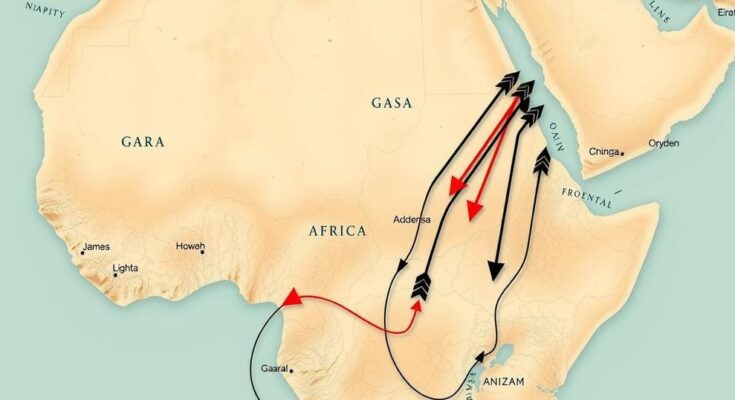The U.S. and Israel are reportedly considering the forced displacement of Palestinians from Gaza to East Africa, engaging with Sudan, Somalia, and Somaliland. Sudan has rejected offers, while Somalia and Somaliland claim ignorance of the contacts. This follows President Trump’s controversial proposal of relocating Palestinians, which has faced widespread condemnation as ethnic cleansing. Experts urge global leaders to reject these plans, citing ethical concerns.
Recent reports indicate that officials from the United States and Israel have approached the governments of Sudan, Somalia, and Somaliland with proposals regarding the forced displacement of Palestinians from Gaza. According to information gathered by The Associated Press, Sudan has reportedly rejected these overtures, while officials in Somalia and Somaliland claim to be unaware of any discussions occurring.
The discussions regarding potential relocation options for Palestinians have surfaced shortly after President Donald Trump’s controversial suggestion of forcibly relocating Palestinians and annexing the Gaza Strip. This notion has faced widespread backlash from Palestinians and various Middle Eastern nations, with many condemning it as a form of ethnic cleansing.
It has come to light that Israel is spearheading diplomatic efforts to facilitate this displacement, despite the lack of clear advancements in these discussions. Israeli Finance Minister Bezalel Smotrich expressed the intent of working on identifying countries willing to accept Palestinian immigrants, which may include establishing a dedicated emigration department within the Israeli Ministry of Defense.
Experts assert that this proposed displacement represents a critical violation of ethical standards. Tamer Qarmout, an academic, emphasized the obligation of global leaders to oppose such proposals, particularly as they exploit nations still grappling with the repercussions of colonialism, such as Sudan and Somalia.
There are indications that East African nations may be offered various incentives, including financial, diplomatic, and security assistance, in exchange for accepting resettled Palestinians. A US official confirmed that quiet negotiations with Somaliland are ongoing, focusing on potential areas of cooperation in exchange for international recognition. The motivations behind Somalia’s involvement are also questioned, given the country’s longstanding support for Palestinian autonomy.
It has been noted that Sudanese officials, speaking under conditions of confidentiality, confirmed that approaches from the Trump administration regarding the citizenship of Palestinians began even prior to the president’s inauguration. However, the Sudanese government has definitively dismissed these proposals, reiterating its rejection of any discourse on the matter.
In summary, both the United States and Israel are reportedly engaged in discussions aimed at facilitating the forced relocation of Palestinians from Gaza to specific East African nations. These proposals have met significant resistance and condemnation from affected governments and human rights advocates alike. The ethical implications of displacing vulnerable populations, combined with historical tensions in the region, underscore the complexity of this issue, raising critical questions regarding the responsibilities of global leaders in addressing humanitarian crises.
Original Source: www.aljazeera.com




